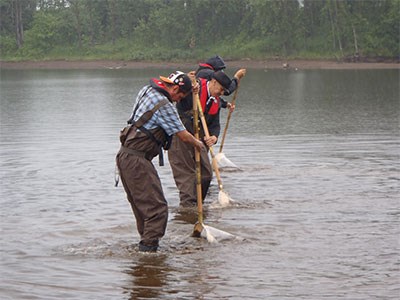Development in the Ring of Fire is years away, but Indigenous communities in Matawa First Nations territory are strategically going about training their people so they’ll be ready for development when it arrives.
Since 2011, Four Rivers, Matawa’s First Nations Environmental Services Group, has provided the tribal council’s nine communities with information and resources to help them make decisions about the management of their natural resources.
“With everything that’s going to be happening, with the Ring of Fire, with mining activity, it’s really important that our First Nations are granted or given the opportunity to be autonomous in their jurisdictions over their lands,” said Beedahbin Desmoulin, Four Rivers’ interim manager of environmental programs.
Training for community members has been varied and responsive to community needs.
In 2014, in collaboration with Confederation College and Noront Resources, Matawa provided training in environmental monitoring through Kiikenomaga Kikenjigewen Employment & Training Services (KKETS).
Nine people from the various communities completed the training; some found employment in mining and forestry, while others continue to work in their communities.
Matawa continues to provide training, sending its two GIS technicians out to the individual communities to assist the communities with land-use planning.
Matawa can even train community members in the use of Microsoft programs such as Word and PowerPoint, programs Desmoulin said are “essential to communicating to their members with the news of anything that’s happening.”
“It helps them become more independent that way, as opposed to having to contract those types of services out,” she noted.
For the last two years, the community has employed a mineral development information support officer, whose job is to provide workshops on mineral development.
The role of that full-time staff member is solely to travel to individual communities to explain to members how the mining process works, from the first stages of exploration to the construction of a mine through to the extraction and processing of the ore.
For communities who haven’t before had experience with mining, the process can be daunting.
“It’s overwhelming,” Desmoulin said. “And to think that all of our communities have to get a good grasp or understanding on that whole process, and then enable their communities to grasp that process.”
This year, Four Rivers held its inaugural Environmental Planning Conference for the nine Matawa communities. More than 70 community members participated in the workshops and discussion.
The next step will be to continue the dialogue in the individual communities, Desmoulin said, along with, potentially, an “environmental assessment road show” that focuses particularly on the EA process.
“It’s a dialogue that had to happen, because it showed us there’s a need for it,” Desmoulin said.
Matawa is now planning to set up an “environmental network” that will help the nine communities communicate and network with each other about environment-related information that could affect the communities in the territory.
There is currently some communication between communities, but not everyone is informed about what’s happening in the other First Nations, Desmoulin said.
Communication is a key component that is often overlooked by funding agencies, but is integral to ensuring outreach and awareness for all community members, she noted.
“They all have to be on board, and the only way to do that is through the communication piece.”
Desmoulin anticipates the environmental network to be up and running in the spring.




